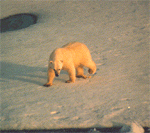Climate Change Impacts
Climate change is more than a warming trend. Increasing temperatures will lead to changes in many aspects of weather, such as wind patterns, the amount and type of precipitation, and the types and frequency of severe weather events that may be expected to occur. Such climate change could have far-reaching and/or unpredictable environmental, social, and economic consequences as well as serious effects to human health.
Environmental Impacts

Polar Bears are unlikely to survive if there is a complete loss of summer sea-ice
cover. Click
to enlarge. |
Across Canada, we will feel and see the effects of climate change:
- Nunavut – Summer melting of glaciers may lead to wide-scale flooding. If the Greenland Ice Sheet melts, it contains enough ice to raise the global sea level by six to seven metres.
- Western Arctic – Thawing of permafrost, or permanently frozen ground, could impact buildings and roads constructed for those solid conditions. Meanwhile, seasonal forest fire danger levels are predicted to increase in the Yukon and Northwest Territories
- British Columbia – Of greatest concern are 'debris flows' - watery slurries of mud, gravel, and boulders that travel at high speeds down steep mountain stream courses during heavy rains. Warmer winters may increase insect pests while wetter springs may delay planting.
- Prairies – Hotter and longer summers result in increased evaporation and less surface water is available for use. Forty percent of the rural population of Saskatchewan relies on groundwater.
- Ontario – A warmer climate and longer frost-free seasons may permit the spread of new diseases from warmer climates, such as Lyme disease, malaria, and West Nile virus.
- Quebec – The freshwater portion of the St. Lawrence River may see a deterioration in water quality, loss of wetland habitats and reduction in biodiversity. Droughts would mean less water available for consumption, agriculture, and recreation and more conflicts over use.
- Atlantic – Highly sensitive to the effects of sea-level rise, this portion of Canada will experience such effects as increased erosion, rapid migration of beaches, and flooding of coastal freshwater marshes.
Health Impacts
With hotter, longer and more humid warm weather brought on by climate change, we will experience numerous health-related impacts:
- heat-related illnesses (heat stroke and dehydration)
- respiratory and cardiovascular illness
- physical and mental stress
- spread of infections
- increase in microorganisms that can contaminate drinking water and food
To learn more about the environmental impacts of climate change and the impacts to human health in Canada, visit the Government of Canada Climate Change website.